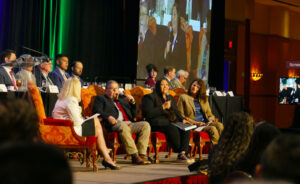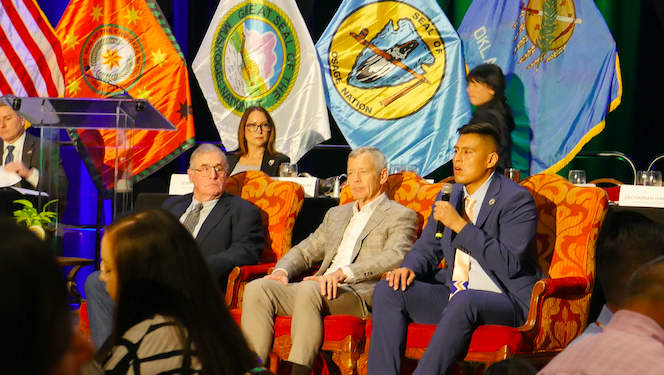TVLSE, Oklv. – The Tulsa Regional Chamber of Commerce held their inaugural State of the Tribal Nations’ event at the Tulsa Renaissance Center on Thursday, April 18. The fully-booked luncheon event featured panel discussions with representatives from the three major Tulsa area tribes. Representatives of the Muscogee (Creek) Nation, the Cherokee Nation, and the Osage Nation spoke about economic developments, tourism, and cultural education programs.
“…it’s important that our voices are part of the decisions that are made in our communities…” – RaeLynn Butler, MCN Secretary of Culture and Humanities
MCN Secretary of the Nation Zechariah Harjo and Secretary of Culture and Humanities RaeLynn Butler attended the event. The event began with a land acknowledgement given by Butler. As becoming common practice at public events and gatherings, acknowledgements recognize the Indigenous stakeholders and original inhabitants of the land. Butler acknowledged the Osage Nation, Cherokee Nation, and MCN as well as the Caddo and Quapaw who inhabited the land before the removals.
The event featured a discussion with Cherokee Nation Principal Chief Chuck Hoskin, Jr and Osage Nation Principal Chief Geoffrey Standing Bear. Chief Hoskin emphasized a theme throughout the event, the partnerships necessary for success within the state. He said,
“The Cherokee word Gadugi, working together. So you would look at what we’re doing in the state, we’re indispensable. We’re inextricably linked to whether this state is going to succeed or whether it’s going to fail. And it’s going to succeed because the Cherokee people were meant to succeed. As long as we’re working together, I think, success is just in our DNA.”
Harjo, speaking about tribal economic development, highlighted many collaborative development projects, like the south Tulsa and Jenks Low Water Dam project, and emphasized the opportunities for partnering with Tribal Nations. He said, “So our economic development is really surrounding the support of the communities and we have a number of projects that demonstrate that from the City of Tulsa all the way through our own communities and throughout our reservation.”
Discussions also included examples of progress in infrastructure development, health technology, energy, and rural broadband access. Harjo also spoke about the intersections of technology and education, addressing access for Native students in STEM fields.
In her remarks, Butler focused on the importance of Mvskoke cultural resilience, sharing of history, and plans for an MCN welcome center and museum. She said: “With the Mvskoke Nation, culture is our foundation. We wouldn’t be who we are without our culture, without our language. We maintain our traditional ways of life, our churches. And we have great pride and have longevity in maintaining that culture I think, which is critical to moving forward. So our mission is really to try to preserve, protect, but also to promote and help the next generation to keep moving forward in this place.”

The significance of land acknowledgement was something not to be underscored at Thursday’s event. In answer to a broad question about non-Native understandings of history, Butler replied:
“Everybody who lives south of Admiral Street or works out in Admiral is probably on a Mvskoke allotment. We can tell you who lived there. We can help you develop a land acknowledgment. We can help you tell our history and our stories of these lands… You know, there’s a lot of opportunities to partner with us. We’re seeing the most growth in our Nation and other’s at this time… Our hands are out ready to meet new people and to build partnerships with everybody because we do feel it’s important that our voices are part of the decisions that are made in our communities, but also that our history is full practically. You know, if you’re learning our history from a book, most likely it wasn’t written by us. And so it’s important for you to reach out to the Nation directly. We can help get you in touch with the right people.”
The event was well attended by local and area groups. These included businesses and community partners like Arvest Bank, Tulsa World, and the Grand River Dam Authority.
Also featured at the event were the Tulsa Indian Club singers and a performance by Native Praise Choir. The event was sponsored by TRCC partners Thompson Construction and Vast.bank.





